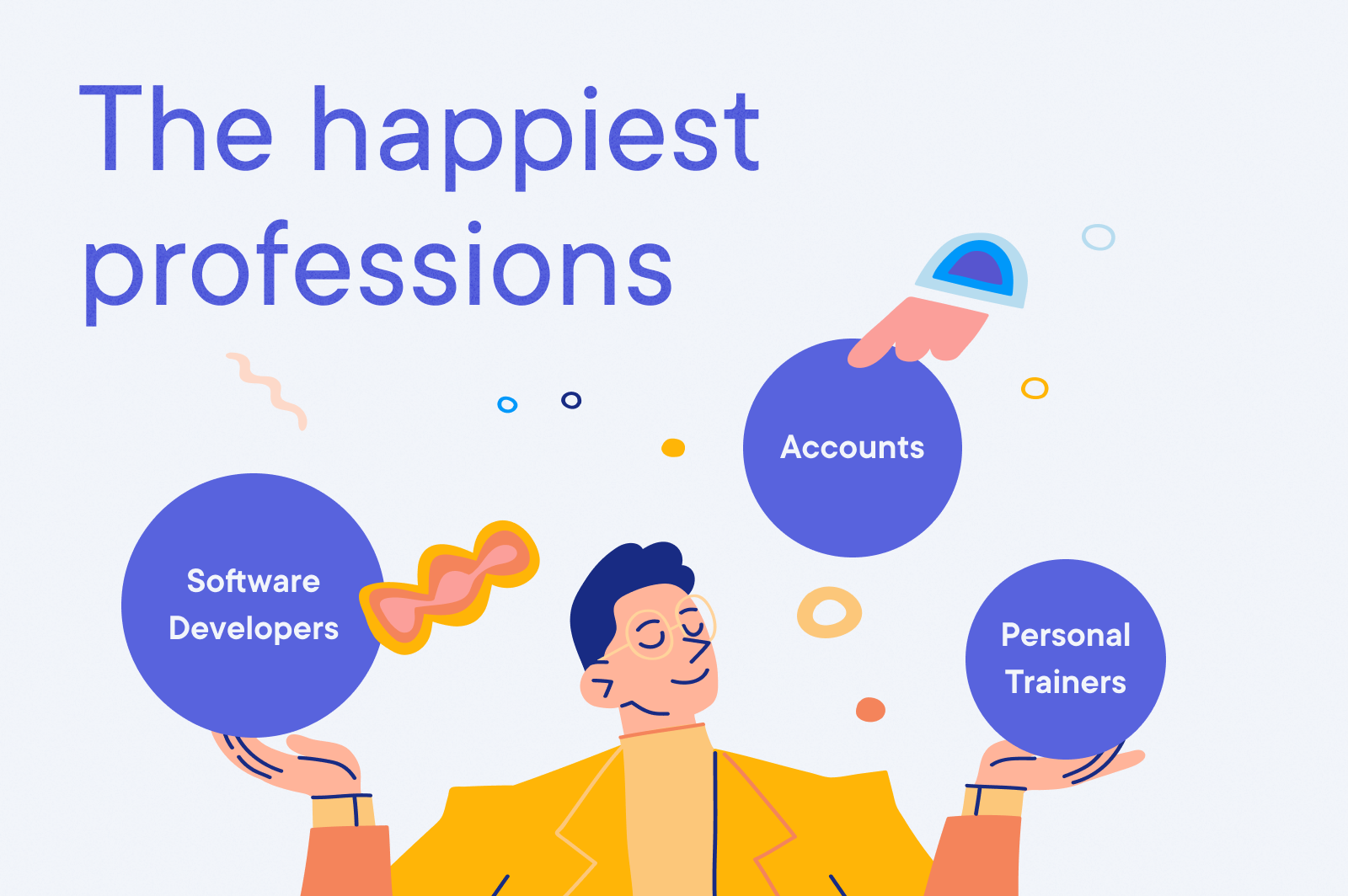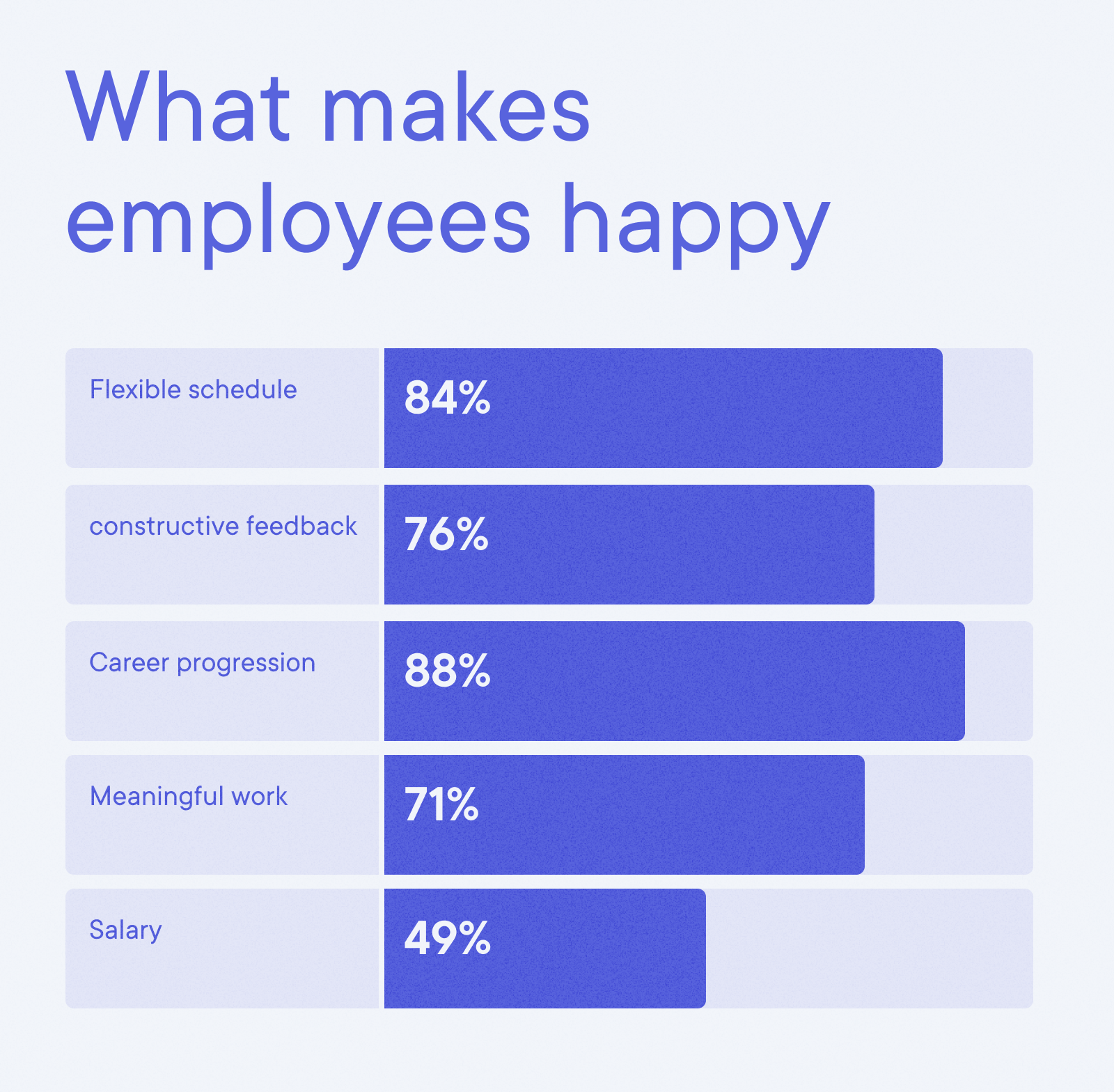Over the years we have seen a significant improvement in the way businesses prioritize employee welfare, satisfaction, and mental health. From counselling services to coffee hours, the happiness of professionals is quickly becoming paramount in the modern-day workplace.
Intrigued to understand whether companies are getting it right and what they could do better, Resume.io surveyed more than 3,000 professionals to find out which are the happiest professions and the main reasons for their happiness.

The top 10 happiest professions
| Profession | % of employees that are happy in their role |
|---|---|
| Software Developers | 87% |
| Accountants | 83% |
| Personal Trainers | 79% |
| Engineers | 72% |
| Psychologists | 66% |
| Marketers | 61% |
| Teachers | 54% |
| Nurses | 51% |
| Architects | 49% |
| Gardeners | 47% |
Resume.io can reveal that out of 20 industries, software developers have been crowned the happiest profession, with 87% claiming to be ‘very happy’ with their current role. Below, you will find that the happiest companies are all IT-related.
Shortly behind software developers, as the second happiest profession, are accountants. Despite horror stories of accountants’ workloads and dull tasks, more than 4 in 5 employees surveyed from this industry said that they were happy in their job.
Meanwhile, third on the list of happiest careers are personal trainers, with 79% of respondents claiming to be happy in their role. With exercise releasing endorphins, helping to bring about feelings of euphoria and general well-being, it is no surprise that personal training ranked so highly among the professions that are most content.
Interestingly, experts in emotions placed only as the fourth happiest profession, with two thirds of psychologists expressing workplace joy. Following closely behind are marketers, in fifth, with 61% of marketers surveyed expressing that they are happy in their role - almost two thirds!
Want a slightly different perspective? Watch this video for a Top 5 list of happiest professions.
If you love the pressure, you may think of the happiest jobs as the most stressful jobs. If so, here are some ideas for you from U.S. News.
- Become a physician.
- Manage an IT department.
- Specialize in anesthesiology.
- Take on a companies finances.
These stressful jobs also come with emotional and financial rewards, with salaries in the six figures, but when times get tough, these careers can be pressure cookers.
You might also like: REVEALED: The names most likely to “pull a sickie”
The happiest companies to work for
Sometimes where you work is as important as what you do if you are looking to be happiest. A Comparely survey found the happiest jobs in America are at Zoom Video Communication where 97% of employees gave the company positive reviews. HubSpot has the second happiest jobs, followed by Microsoft in third.
If your happy place is a small or mid-size company, here are your best bets for the happiest companies:
- Imprivata, a digital identity company
- TaxJar, a sales tax compliance company
- Snyk, a security company
Notice the tech slant of all of the happiest companies in America.
Here are some quick answers to your urgent career questions:
What are the easiest jobs with the highest pay?
A: Some of that depends on your definition of “easy,” but we’re going with least stressful as our idea of easy. In that case, you should consider becoming an aerospace engineer, mathematician or political scientist. All three make upwards of $100,000 and rank among the lowest stress careers. You can see the complete list of least stressful careers on O*Net. .
Which happiest jobs are in high demand?
There’s a theme here and it’s technology. The happiest career in America is also in high demand. Software developers won’t have any trouble finding a job with a predicted 22% growth through 2029, and, as you learned in our list of top 10 happiest professions, they rank no. 1 for happiness. If you’re not technology-minded, consider becoming a speech and language pathologist. That’s a growing career with a high happiness factor.
What jobs pay over $100K without a degree?
College is expensive and time-consuming. If you want to jump right into the job market, but have dollar signs in your eyes, you may want to start a business, become a real estate broker or a sales consultant. Money Check lists 14 possibilities for you.
What are the most unhappy careers?
You’re unlikely to aspire to be a parking lot attendant, but Stacker ranked it as the worst job in America. Many of the jobs on that list are low-skill, low-pay positions. Watch this video to learn about the careers with the highest job dissatisfaction.
What jobs will disappear by 2030?
A: If you are future thinking, definitely do not become a watch repairer. There’s not much call for them and the pay is substandard. Prefab home builders and textile machine workers will also struggle to stay employed in the future. Most dying careers involved the advent or improvement of automation, according to Kiplinger.
What factors make professionals happiest at work?
As well as which professions are the happiest, we also sought to unveil precisely what it was that brought individuals the most pleasure at work. We asked respondents to disclose which company perks made them happiest at work, what made them happy about their role in general, and how their workplace environment and colleagues impacted their happiness.
Which company perks make employees the happiest?
When asked which company perks improved their workplace satisfaction, a staggering 86% revealed that they love the comfort of their own home, with a work from home scheme ranking as the most popular perk among respondents.
Meanwhile, financial perks, such as bonuses and benefits, placed as the second most popular perk, with schemes like these deemed attractive by a bit more than 4 in 5 professionals.
Freebies of any kind also proved popular. Free social events were said to make 77% of professionals happy at work, meanwhile roughly 70% of respondents took a liking to the availability of anything from free food and drinks, to free training and courses.
Although it seems many employees are fairly short-sighted when it comes to perks, since only a third of respondents said that a strong retirement and pension plan contributes to their happiness at work.
What makes employees happy about their job?
When asked broadly about what made respondents happy about their job in general, we found that a positive boss was the most important and popular factor - with 9 in 10 of those surveyed citing this reason. Meanwhile 89% said that being their own boss boosts their happiness.
Among the other most important factors for employee happiness was a flexible schedule (84%), constructive feedback (76%), good opportunities for career progression (88%) and the completion of meaningful work (71%).
Surprisingly, just under half of the respondents (49%) said that their salary made them happy at work - suggesting that employees aren’t content with their salary and are possibly considering a new role, or that it simply isn’t that important to them.

What Makes Employees Happy About Their Workplace?
We also asked professionals what made them happy about their workplace. Following the 2020 coronavirus pandemic, it is no surprise that cleanliness and hygiene ranked as the most important factor, with almost 9 in 10 respondents deeming this to be important.
Meanwhile, high quality equipment was also said to improve happiness in the workplace, with this factor placing as the second most likely to bring workplace satisfaction. In fact, high quality resources, such as comfortable chairs, were said to make an impressive 87% of people happier with their working environment.
Air conditioning stole the title of the third biggest driver of employee satisfaction, with 86% saying this improved their happiness in the office. Thereafter, recreational activities also proved popular, with 4 in 5 professionals saying that equipment, such as video games, TVs and ping pong tables improved their workplace experience.
Interestingly, only 37% of individuals said that their office interior and exterior changed their mood, despite having to see it every day!
How important are colleagues to employee happiness?
Do those we work with have an impact on our happiness at work? Our survey can reveal that almost all respondents (98%) said that having friendly colleagues improved their happiness at work.
Meanwhile, having opportunities to socialise with these colleagues also proved important for 61% of employees. In line with this, 79% of professionals shared their altruistic side by saying that helping others improved their workplace mood.
On the other hand, a large proportion of respondents said that working from home gave them a welcome break from socialising with colleagues, as 38% said that having this break contributed to their happiness.
Revealing a sneaky side to many professionals, Resume.io also discovered that gossiping about colleagues was a common habit that contributed to workplace happiness, with 2 in 5 saying that gossiping about fellow staff improves their workplace satisfaction!
What job is best for me?
The job that is best for you is an extremely personal question. There are dozens of career quizzes and services out there that will cost you anywhere from a few dollars to hundreds for personalized advice.
Only you know what your priorities are and what interests and abilities you have. To help sort through your options you may try these tips:
- Complete career assessments: don’t rely on one since they each have a slant.
- Clarify your goals and values.
- List all your options and then winnow the list down.
- Make a Venn diagram or use another method of finding overlap among what companies want, what you are good at and what you like to do.
- Network. Ask people about their jobs.
- Shadow someone in a career that interests you.
- Seek out a mentor to guide you.
Methodology
Resume.io surveyed 3,500 respondents from 20 different sectors. This equates to approximately 175 people per sector. All professionals surveyed were from a range of different nationalities.






